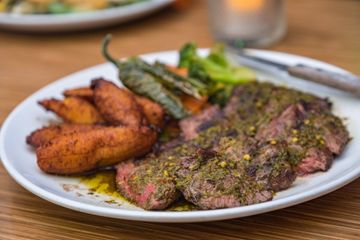Is Mexican Food Healthy And Balanced? Unpacking the Nutritional Perks of Traditional Components
The question of whether Mexican food is healthy invites an expedition of its typical ingredients. Beans and corn function as fundamental staples, abundant in healthy protein and fiber. Avocados offer advantageous fats, while different natural herbs and seasonings include flavor and health benefits - mexican food. Together, these parts develop a tapestry of nutrition. The healthiness of Mexican food usually depends on preparation techniques and part sizes. What function do these elements play in identifying its overall nutritional worth?
The Power of Beans: Healthy Protein and Fiber-Rich Staples
Although frequently neglected, beans act as a cornerstone of Mexican cuisine, offering a riches of nutritional benefits. Rich in protein, they are an exceptional plant-based choice for those looking for to satisfy their nutritional healthy protein requires. This high healthy protein material supports muscular tissue fixing and growth, making beans indispensable for both meat-eaters and vegetarians alike. Furthermore, beans are a phenomenal resource of dietary fiber, which assists in digestion and promotes a sensation of volume, potentially assisting with weight administration.
The variety of beans made use of in Mexican meals, such as black beans, pinto beans, and kidney beans, adds to a varied flavor account and can boost dishes nutritionally. Beans are reduced in fat and contain crucial vitamins and minerals, including magnesium, iron, and folate. With each other, these attributes make beans an essential active ingredient, supplying both nourishment and food in standard Mexican fare.
Corn: a Versatile Grain With Nutritional Perks
Corn attracts attention as a versatile grain fundamental to Mexican food, commemorated not just for its cooking applications yet additionally for its remarkable dietary account. As a main active ingredient in recipes like tortillas, tamales, and pozole, corn gives essential nutrients that contribute to a balanced diet. Rich in carbohydrates, it acts as a significant power resource, while likewise being reduced in fat, making it a favorable option for different dietary requirements.
Corn is an excellent resource of dietary fiber, which aids in food digestion and promotes satiation. It consists of significant amounts of vitamins such as B-complex vitamins, which are essential for basal metabolism. The presence of antioxidants, especially carotenoids, contributes to overall health by reducing oxidative stress. Additionally, corn is gluten-free, accommodating those with gluten level of sensitivities. Generally, the nutritional advantages of corn highlight its significance in traditional Mexican food and its duty in a healthy diet regimen.
Avocados: Healthy And Balanced Fats and Nutrients in Every Bite
Avocados play a considerable role in Mexican food, complementing recipes with their velvety texture and abundant flavor. Beyond their culinary charm, avocados are commemorated for their impressive nutritional account. They are a rich resource of healthy and balanced monounsaturated fats, which can help reduced poor cholesterol levels and support heart health. In addition, avocados are loaded with crucial nutrients, including potassium, vitamin E, and B vitamins, adding to total wellness.
The high fiber content in avocados help digestion and advertises satiety, making them a beneficial enhancement to any dish. Their distinct nutrient composition can likewise support skin health and wellness and provide anti-inflammatory advantages. Incorporating avocados into traditional Mexican meals or appreciating them as a standalone snack can improve both taste and nutrition, demonstrating why they are a precious staple in Mexican cuisine. In general, avocados use a delicious method to enjoy healthy fats and vital nutrients in every bite.

Flavors and Natural Herbs: Flavorful Health And Wellness Boosters
While taking pleasure in the abundant tastes of Mexican food, one can not neglect the necessary role that spices and herbs play in enhancing both taste and health. Ingredients such as oregano, cilantro, and chili peppers not only add to the vibrant taste account however likewise offer considerable health and wellness benefits. As an example, cilantro is understood for its purifying residential properties, assisting to get rid of hefty metals from the body, while oregano is packed with anti-oxidants and possesses anti-inflammatory results.
Chili peppers, a staple in numerous Mexican dishes, have capsaicin, which has actually been connected to boosted metabolic process and pain alleviation. Furthermore, spices like cumin and coriander assistance digestion and might help in blood glucose regulation. Including these tasty health and wellness boosters into dishes not only boosts the culinary experience however also advertises overall health, making Mexican cuisine not simply delicious, yet also nutritionally useful.
Traditional Food Preparation Methods: Enhancing Nourishment and Taste
Standard food preparation techniques in Mexican food play a vital function in enhancing both nutrition and taste, as they typically focus on fresh components and classic methods. Methods such as nixtamalization, where corn is soaked and prepared in an alkaline solution, not just enhance the nutrient account of tortillas but likewise boost their digestibility - freshly made guacamole. Furthermore, using slow-moving cooking techniques, like cooking or braising, permits flavors to combine perfectly while retaining the stability of the components

Regularly Asked Concerns
Are Mexican Food Portions Typically Larger Than Other Cuisines?
Mexican food sections are commonly larger than those of lots of various other cuisines. This particular mirrors conventional eating practices, highlighting public sharing and hearty dishes, which can lead to a more considerable offering dimension overall.
Exactly how Does the Preparation Technique Affect Healthfulness of Mexican Food?
Prep work approaches significantly influence the healthfulness of Mexican food. Methods such as cooking or steaming maintain nutrients, while frying can increase undesirable fat web content. Choices of components and cooking designs inevitably determine overall nutritional value.
Can Mexican Food Be Tailored for Particular Nutritional Restrictions?
Mexican food can undoubtedly be customized for certain nutritional New York Times rated limitations. Replacements, such as making use of corn tortillas for gluten-free diet regimens or including even more veggies, make it possible for people to take pleasure in typical tastes while accommodating various nutritional demands.
What Are Usual Misunderstandings Regarding Mexican Food and Health And Wellness?
Typical mistaken beliefs regarding Mexican food consist of the idea that it is naturally harmful, extremely hot, and exclusively concentrated on fats. Actually, standard meals typically feature nutritious ingredients and can be tailored to numerous nutritional requirements.
Are There Healthier Alternatives at Mexican Dining Establishments?
Much healthier options at Mexican restaurants commonly consist of barbequed meats, beans, and fresh veggies. Selecting dishes that stress entire active ingredients and preventing heavy sauces can bring about a more nourishing dining experience, promoting general well-being.
The selection of beans utilized in Mexican recipes, such as black beans, pinto beans, and kidney beans, contributes to a varied flavor profile and can boost dishes nutritionally. Avocados play a substantial role in Mexican food, enhancing meals with their luscious structure and abundant taste. Integrating avocados right into conventional Mexican dishes or appreciating them as a standalone treat can enhance both taste and nourishment, demonstrating why they are a precious staple in Mexican cuisine. While appreciating the rich tastes of Mexican food, one can not overlook the crucial role that spices and natural herbs play in enhancing both taste and wellness. Conventional food preparation methods in Mexican cuisine play an important duty in boosting both nutrition and flavor, as they often prioritize fresh active ingredients and time-honored strategies.